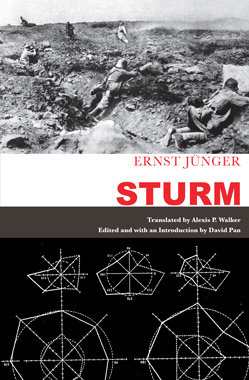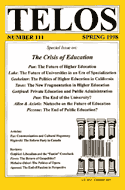In the inaugural episode of the Telos Press Podcast, David Pan and Russell Berman talk with Fred Siegel about his forthcoming book The Crisis of Liberalism: Prelude to Trump. Order your copy today in our online store and save 20% off the list price. In the podcast, Siegel discusses the growth of the administrative state, the similarities between former New York City mayor John Lindsay and Barack Obama, the Black Lives Matter movement, the echoes of the 1960s in today’s politics, and the rise of left-wing fascism.
|
Coming on October 1st from Telos Press Publishing: Ernst Jünger’s Sturm. Pre-order your copy today, and we will ship it as soon as it is available. Sturm
Translated by Alexis P. Walker Set in 1916 in the days before the Somme offensive, Ernst Jünger’s Sturm provides a vivid portrait of the front-line experiences of four German infantry officers and their company. A highly cultivated man and an acute observer of his era, the eponymous Lieutenant Sturm entertains his friends during lulls in the action with readings from his literary sketches. The text’s forays into philosophical and social commentary address many of the themes of Jünger’s early work, such as the nature of war, death, heroism, the phenomenon of Rausch, and mass society. Originally published in installments in the Hannoverscher Kurier in 1923, Sturm fell into obscurity until 1960, when it was re-discovered and subsequently re-published by Hans Peter des Coudres, a scholar of Jünger’s work. This translation—the first to be published in English—brings to the English-speaking world a work of literature of interest not only to students of Jünger’s work and of World War I, but to any reader in search of a powerful story of war and its effects on the lives of the men who endure it. In this video, Adrian Pabst interviews David Pan about the current issue of Telos, a special issue about Carl Schmitt’s Hamlet or Hecuba: The Intrusion of the Time into the Play. David has translated Schmitt’sHamlet or Hecuba and also co-edited the special issue together with Julia Lupton. The significance of this book for a proper understanding and assessment of Schmitt’s oeuvre can hardly be overstated. It highlights the centrality of culture and literature in his political thought, including the role of myth, theater, representation, and tragedy. The conversation with David also touches on the concrete contemporary relevance of these themes for politics, in particular a broader notion of truth and values than technocracy or managerialism.
On Tuesdays at the TELOSscope blog, we highlight a past Telos article whose critical insights continue to illuminate our thinking and challenge our assumptions. Today, Maxwell Woods looks at David Pan’s “The Crisis of the Humanities and the End of the University,” from Telos 111 (Spring 1998). |
||||
|
Telos Press Publishing · PO Box 811 · Candor, NY 13743 · Phone: 212-228-6479 Privacy Policy · Data Protection Copyright © 2025 Telos Press Publishing · All Rights Reserved |
||||

 Acknowledged by the London Times as the center of one of the five greatest orchestras in the world (the Simón Bolívar Youth Orchestra), generating some of today’s most important musicians, and declared by the renowned conductor Simon Rattle as the “future of music,” a new educational force has penetrated the international music consciousness. Yet, the educational institution producing one of the world’s most significant orchestras is not the result of the traditional bastions of Western orchestral music; instead, it is the direct consequence of community education in the barrios of Venezuela. The youth music program, “El Sistema,” functions by organizing “nucleos,” educational centers started and maintained by local leaders for high-level orchestral music that are located in and run as part of the community. Instead of being sent off to the conservatory or university, children learn how to play orchestral music in their own neighborhood from instructors who are members of the locality.
Acknowledged by the London Times as the center of one of the five greatest orchestras in the world (the Simón Bolívar Youth Orchestra), generating some of today’s most important musicians, and declared by the renowned conductor Simon Rattle as the “future of music,” a new educational force has penetrated the international music consciousness. Yet, the educational institution producing one of the world’s most significant orchestras is not the result of the traditional bastions of Western orchestral music; instead, it is the direct consequence of community education in the barrios of Venezuela. The youth music program, “El Sistema,” functions by organizing “nucleos,” educational centers started and maintained by local leaders for high-level orchestral music that are located in and run as part of the community. Instead of being sent off to the conservatory or university, children learn how to play orchestral music in their own neighborhood from instructors who are members of the locality. 

